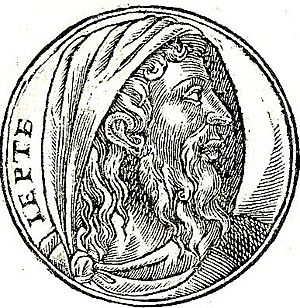Jephthah facts for kids
Quick facts for kids
Jephthah
|
|
|---|---|
| יפתח | |

Jephthah, shown here in an old book called Promptuarii Iconum Insigniorum
|
|
| Predecessor | Jair |
| Successor | Ibzan |
Jephthah (pronounced JEF-thuh; Hebrew: יִפְתָּח, Yīftāḥ) was an important leader in ancient Israel. He is known as a "judge" who led the Israelites for six years, as told in the Book of Judges in the Bible (Judges 12:7).
Jephthah lived in a region called Gilead. His father was also named Gilead, and his mother was described in a way that might mean his father could have been any man from that area. Jephthah led the Israelites in a big battle against the Ammonites. Before the battle, he made a special promise, called a vow, to God. He promised to sacrifice the first thing that came out of his house if he won the battle.
Sadly, when he returned home after winning, his only daughter was the first to come out to greet him. Jephthah was very sad and regretted his promise, but he felt he had to keep it. He carried out his vow, which meant sacrificing his daughter to God.
Even though he was a judge for only six years, Jephthah is considered one of the "major judges" in the Bible because his story is told in great detail.
Contents
Jephthah's Story
The story of Jephthah is found in the Book of Judges, in chapters 11 and 12. The Bible says that the Israelites had stopped following God, which made God upset. So, God allowed their enemies, the Philistines and the Ammonites, to cause them trouble.
Early Life and Leadership
Jephthah was born in a difficult situation; his half-brothers drove him away from home. He went to live in a place called Tob, east of Gilead. There, some people who were also outcasts joined him, and they would go on raids together.
Later, when the Ammonites were attacking, the elders (leaders) of Gilead asked Jephthah to lead their army. Jephthah agreed, but only if they would make him their permanent leader after he defeated the Ammonites. The elders agreed to his terms. Jephthah then challenged the Ammonites, trusting in God's help.
The Difficult Vow
After Jephthah won the battle, he returned home. His only child, his daughter, was the first to come out of his house to meet him. Jephthah was heartbroken. He tore his clothes and cried, "Oh no, my daughter! You have brought me so much sorrow!" But he felt he had to keep his promise to God.
His daughter understood and asked for two months to go to the mountains with her friends to mourn that she would never marry or have children. After two months, Jephthah did what he had promised. The Bible says that after this, the women of Israel would go each year for four days to remember Jephthah's daughter.
Conflict with Ephraim
Later, Jephthah had to fight against the Ephraimites. They were upset because he hadn't asked for their help against the Ammonites. During this fight, Jephthah's men identified the Ephraimite soldiers by their accent. The Ephraimites pronounced the Hebrew word shibboleth as sibboleth. Because of this, 42,000 Ephraimites were defeated (Judges 12:5–6).
Jephthah is also mentioned in the New Testament, in the Epistle to the Hebrews 11:32. There, he is praised for his strong faith.
Jephthah's Influence in Culture
The story of Jephthah has inspired many books, plays, and musical works over the centuries.
- Historia di Jephta is an oratorio (a musical story) by Giacomo Carissimi.
- Jephthes, sive Votum is a play written by George Buchanan in 1554.
- Jeptha of Offerbelofte is a Dutch play from 1659 by Joost van den Vondel, which was based on Buchanan's play.
- Jephté is a tragedy (a serious play) from 1703 by Charles Piroye.
- Jephté is an opera (a play with singing) by Michel Pignolet de Montéclair from 1732.
- Jephtha is a famous oratorio by George Frideric Handel from 1751.
- Songs from Oratorio of Jephtha was created by John Hill Hewitt in 1845.
- Jephtas Gelübde is an opera based on the story by Meyerbeer.
- The Vow is an opera by Colin McAlpin.
- The historical novel Jefta und seine Tochter (1957) by Lion Feuchtwanger tells Jephthah's story. It was translated into English as Jephta and His Daughter.
- In William Shakespeare's play Hamlet, a character named Polonius mentions Jephthah.
- The painting Annabelle and Guy by Matan Ben-Cnaan, which won the BP Portrait Award in 2015, was inspired by Jephthah and his daughter.
- The 2008 novel Ever by Gail Carson Levine is also based on the story of Jephthah's daughter.
See also
 In Spanish: Jefté para niños
In Spanish: Jefté para niños
- Abel-cheramim
- Biblical judges
- Binding of Isaac
 | Madam C. J. Walker |
 | Janet Emerson Bashen |
 | Annie Turnbo Malone |
 | Maggie L. Walker |

